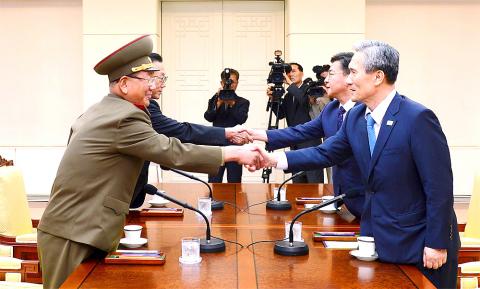Top aides to the leaders of North and South Korea met at the Panmunjom truce village straddling their border yesterday, raising hopes for an end to a standoff that put the rivals on the brink of armed conflict.
The meeting at the demilitarized zone (DMZ) village, known for its sky-blue huts and grim-faced soldiers, was set for half an hour after North Korea’s previously set ultimatum demanding that the South halt its loudspeaker propaganda broadcasts along the border or face military action.
That deadline passed without any reported incidents.

Photo: Reuters
Tension on the Korean Peninsula has been running high since an exchange of artillery fire on Thursday, prompting calls for calm from the UN, the US and North Korea’s only major ally, China. South Korea’s military remained on high alert despite the announced talks, a South Korean Ministry of Defense official said.
South Korean President Park Geun-hye’s national security adviser and her unification minister met North Korean National Defense Commission Vice Chairman Hwang Pyong-so, who is North Korean leader Kim Jong-un’s top military aide, at 6pm.
“The South and the North agreed to hold contact related to the ongoing situation in South-North relations,” Blue House deputy national security adviser Kim Kyou-hyun said in a televised briefing.
Pyongyang on Friday made an initial proposal for a meeting, and Seoul made a revised proposal yesterday seeking Hwang’s attendance, Kim said.
The North’s KCNA news agency also announced the meeting, referring to the South as the Republic of Korea, a rare formal recognition of its rival state, in sharp contrast to the bellicose rhetoric in recent days.
“They need to come up with some sort of an agreement where both sides have saved face. That would be the trick,” Seoul’s Asan Institute for Policy Studies academic James Kim said. “North Korea will probably demand that the broadcasts be cut, and they may even come to an impasse on that issue.”
North Korea, technically still at war with the South after their 1950-53 conflict ended in a truce, not a peace treaty, had declared a “quasi-state of war” in front-line areas and set the deadline for Seoul to halt the broadcasts from loudspeakers placed along the border.
“The situation on the Korean Peninsula is now inching close to the brink of a war due to the reckless provocations made by the South Korean military war hawks,” the North’s KCNA news agency said earlier.
“The fact that these powerful officials who represent South and North Korea’s leaders are meeting means this is a great time to turn the crisis into opportunity,” Seou’s University of North Korean Studies professor Yang Moo-jin said. “It is a breakthrough.”

CHAOS: Iranians took to the streets playing celebratory music after reports of Khamenei’s death on Saturday, while mourners also gathered in Tehran yesterday Iranian Supreme Leader Ayatollah Ali Khamenei was killed in a major attack on Iran launched by Israel and the US, throwing the future of the Islamic republic into doubt and raising the risk of regional instability. Iranian state television and the state-run IRNA news agency announced the 86-year-old’s death early yesterday. US President Donald Trump said it gave Iranians their “greatest chance” to “take back” their country. The announcements came after a joint US and Israeli aerial bombardment that targeted Iranian military and governmental sites. Trump said the “heavy and pinpoint bombing” would continue through the week or as long

TRUST: The KMT said it respected the US’ timing and considerations, and hoped it would continue to honor its commitments to helping Taiwan bolster its defenses and deterrence US President Donald Trump is delaying a multibillion-dollar arms sale to Taiwan to ensure his visit to Beijing is successful, a New York Times report said. The weapons sales package has stalled in the US Department of State, the report said, citing US officials it did not identify. The White House has told agencies not to push forward ahead of Trump’s meeting with Chinese President Xi Jinping (習近平), it said. The two last month held a phone call to discuss trade and geopolitical flashpoints ahead of the summit. Xi raised the Taiwan issue and urged the US to handle arms sales to

BIG SPENDERS: Foreign investors bought the most Taiwan equities since 2005, signaling confidence that an AI boom would continue to benefit chipmakers Taiwan Semiconductor Manufacturing Co’s (TSMC, 台積電) market capitalization swelled to US$2 trillion for the first time following a 4.25 percent rally in its American depositary receipts (ADR) overnight, putting the world’s biggest contract chipmaker sixth on the list of the world’s biggest companies by market capitalization, just behind Amazon.com Inc. The site CompaniesMarketcap.com ranked TSMC ahead of Saudi Aramco and Meta Platforms Inc. The Taiwanese company’s ADRs on Tuesday surged to US$385.75 on the New York Stock Exchange, as strong demand for artificial intelligence (AI) applications led to chip supply constraints and boost revenue growth to record-breaking levels. Each TSMC ADR represents

State-run CPC Corp, Taiwan (CPC, 台灣中油) yesterday said that it had confirmed on Saturday night with its liquefied natural gas (LNG) and crude oil suppliers that shipments are proceeding as scheduled and that domestic supplies remain unaffected. The CPC yesterday announced the gasoline and diesel prices will rise by NT$0.2 and NT$0.4 per liter, respectively, starting Monday, citing Middle East tensions and blizzards in the eastern United States. CPC also iterated it has been reducing the proportion of crude oil imports from the Middle East and diversifying its supply sources in the past few years in response to geopolitical risks, expanding